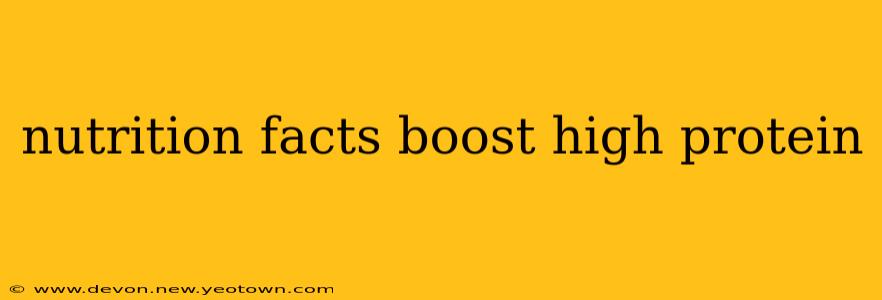Let's be honest, we've all been there. Staring at a nutrition label, deciphering the complex world of grams, percentages, and daily values. But what truly matters? Especially when you're focusing on a high-protein diet? This isn't just about hitting a certain number on the scale; it's about understanding how the protein you consume fuels your body, supports your goals, and contributes to overall well-being. This journey into the world of high-protein nutrition facts will unravel the mysteries of those labels and empower you to make informed choices.
What Makes High-Protein Foods So Special?
Protein is more than just a number on a nutrition label; it's the building block of life. It's what repairs tissues, builds muscle, and supports countless bodily functions. Unlike carbohydrates and fats, which primarily provide energy, protein plays a vital role in creating and maintaining the structures within your body. Think of it as the architect of your cells, constantly working to ensure everything is in its proper place and functioning optimally. A high-protein diet, therefore, offers a multitude of benefits, from increased satiety (feeling full for longer) to improved muscle growth and overall metabolic function.
Deciphering the Nutrition Label: Beyond Protein Grams
While the "protein" number is certainly important, a truly comprehensive understanding of nutrition facts requires a broader perspective. It’s about the whole picture. Let's break down some key elements:
1. How Many Calories are in a Serving?
Calories are units of energy. While protein is crucial, you still need to manage your overall calorie intake to achieve your weight management goals. High-protein foods can be calorie-dense, so pay close attention to portion sizes.
2. What About Fats and Carbohydrates?
Not all fats are bad, and carbohydrates provide essential energy. Look for healthy sources of fats (like those found in avocados or nuts) and complex carbohydrates (like those in whole grains). Understanding the balance between protein, fats, and carbohydrates is key to a well-rounded, nutritious diet.
3. What are the Vitamins and Minerals?
Many high-protein foods, especially those that are minimally processed, are excellent sources of essential vitamins and minerals. Check the label for micronutrients that contribute to your overall health.
4. Is It a Good Source of Fiber?
Fiber aids digestion and promotes gut health. Look for high-protein foods that also offer a decent amount of fiber to support your digestive system.
Frequently Asked Questions (FAQs) about High-Protein Nutrition
Here are some common questions about high-protein nutrition facts that we'll address:
How Much Protein Do I Need Daily?
The recommended daily protein intake varies depending on factors like age, activity level, and overall health goals. Consult a healthcare professional or registered dietitian to determine your individual needs. General guidelines exist, but a personalized assessment is always best.
Are There Risks Associated with High-Protein Diets?
While high-protein diets offer many benefits, they can sometimes lead to issues like dehydration (if not combined with sufficient water intake) and increased strain on the kidneys (especially for those with pre-existing kidney conditions). Moderation and proper hydration are crucial.
What Are Some Good Sources of High-Protein Foods?
Lean meats (chicken, turkey, fish), eggs, legumes (beans, lentils), Greek yogurt, tofu, nuts, and seeds are all excellent sources of protein. Remember to diversify your intake to ensure a wide range of nutrients.
Can I Get Too Much Protein?
While it's difficult to overdose on protein from food sources alone, consuming excessive amounts can be counterproductive and lead to some of the aforementioned risks. Focus on quality protein sources and moderate intake.
Conclusion: Making Informed Choices
Understanding nutrition facts is empowering. It allows you to make conscious choices about the food you consume, aligning your diet with your health goals. By focusing on high-quality protein sources and understanding the broader nutritional context, you can unlock the true power of protein and support your body's optimal functioning. Remember to consult with a healthcare professional or registered dietitian for personalized guidance. They can help you create a balanced meal plan that fits your individual needs and preferences, ensuring that your journey to better health is not only effective but also enjoyable.

